from Apr. 17, 2015
A Nation Mourns Her Martyr'd Son
-
Full Title
A Nation Mourns Her Martyr'd Son
-
Description
Sheet music broadside, with lyrics written by Alice Hawthorn, music composed by Septimus Winner, and published by W. Auner Song Publisher in Philadelphia
-
Source
Library of Congress, Rare Book And Special Collections Division, Portfolio 9, no. 38
-
Rights
This item is in the public domain and may be reproduced and used for any purpose, including research, teaching, private study, publication, broadcast or commercial use, with proper citation and attribution
-
Tags
-
Cite this Item
Septimus Winner (Composer); Alice Hawthorne (Lyricist). "A Nation Mourns Her Martyr'd Son". W. Auner Song Publisher. Remembering Lincoln. Web. Accessed June 15, 2025. https://rememberinglincoln.fords.org/node/726
-
Creator
Septimus Winner (Composer); Alice Hawthorne (Lyricist)
-
Publisher
W. Auner Song Publisher
-
Date
1865
from Apr. 17, 2015
A Nation Mourns Her Martyr'd Son
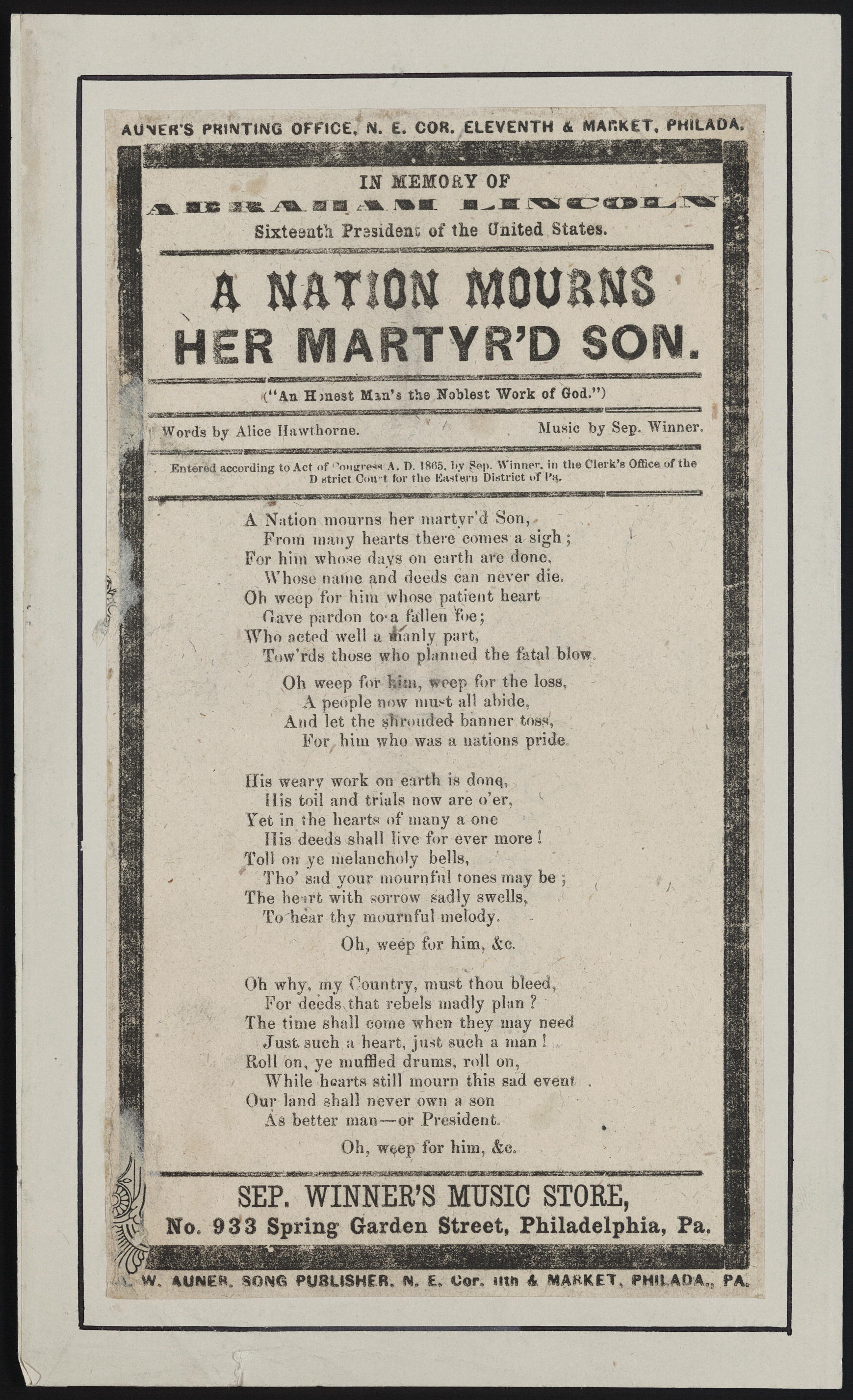
-
Description
Sheet music broadside, with lyrics written by Alice Hawthorn, music composed by Septimus Winner, and published by W. Auner Song Publisher in Philadelphia
-
Source
Library of Congress, Rare Book And Special Collections Division, Portfolio 9, no. 38
-
Rights
This item is in the public domain and may be reproduced and used for any purpose, including research, teaching, private study, publication, broadcast or commercial use, with proper citation and attribution
-
Creator
Septimus Winner (Composer); Alice Hawthorne (Lyricist)
-
Publisher
W. Auner Song Publisher
-
Date
April 17, 2015
from Apr. 17, 2015
Mourning Badge
-
Full Title
Mourning Badge made by Thomas Stevens
-
Description
Ribbon made by Thomas Stevens of Coventry, England. The text says, "Assassinated at Washington 14 April 1865" and then includes the following quote,"I have said nothing but what I am willing to live by. And if it be the pleasure of almighty god to die by. A. Lincoln."
-
Source
Library of Congress, Rare Book And Special Collections Division, Portfolio 9, no. 8
-
Rights
This item is in the public domain and may be reproduced and used for any purpose, including research, teaching, private study, publication, broadcast or commercial use, with proper citation and attribution
-
Tags
-
Cite this Item
Thomas Stevens. "Mourning Badge made by Thomas Stevens". Remembering Lincoln. Web. Accessed June 15, 2025. https://rememberinglincoln.fords.org/node/725
-
Creator
Thomas Stevens
-
Date
1865
from Apr. 17, 2015
Mourning Badge made by Thomas Stevens

-
Description
Ribbon made by Thomas Stevens of Coventry, England. The text says, "Assassinated at Washington 14 April 1865" and then includes the following quote,"I have said nothing but what I am willing to live by. And if it be the pleasure of almighty god to die by. A. Lincoln."
-
Source
Library of Congress, Rare Book And Special Collections Division, Portfolio 9, no. 8
-
Rights
This item is in the public domain and may be reproduced and used for any purpose, including research, teaching, private study, publication, broadcast or commercial use, with proper citation and attribution
-
Creator
Thomas Stevens
-
Date
April 17, 2015
from Apr. 15, 1865
Dr. Moses Gage Diary
-
Full Title
Dr. Moses Gage Diary
-
Description
After calculating the time since he had last written, Dr. Moses Gage, a physician in Bethel, New York, expressed the emotional whiplash many Americans felt at hearing the news of Lincoln's assassination after celebrating the surrender of General Robert E. Lee five days earlier.
-
Transcription
After a lapse of thirty years, five months & twenty three days I open this book to mark a record more sad and distressing than the one with which I ended so many years ago, then my regrets were for a young friend who passed away in the spring time of life. Yesterday, Friday the 14th Abraham Lincoln President of the U.S. was assassinated in the city of Washington, at the time when we were all congratulating our selves that the slaveholders rebellion was nearly over, and when hope pointed to the bright future, when the glory of this republic was about to be revealed, the man who had did more than all others was stricken down by the hand of the Assassin;--The ways of Providence are inscrutable it may be for the [--] we will hope--The hand of an assassin stabbed Secretary Seward thrice & he too is probably dead before this time.
-
Source
Vance Gage
-
Rights
This item may be reproduced and used for any purpose, including research, teaching, private study, publication, broadcast or commercial use, with proper citation and attribution.
-
Tags
-
Cite this Item
Dr. Moses Gage. "Dr. Moses Gage Diary". Remembering Lincoln. Web. Accessed June 15, 2025. https://rememberinglincoln.fords.org/node/695
-
Creator
Dr. Moses Gage
-
Date
April 15, 1865
from Apr. 15, 1865
Dr. Moses Gage Diary
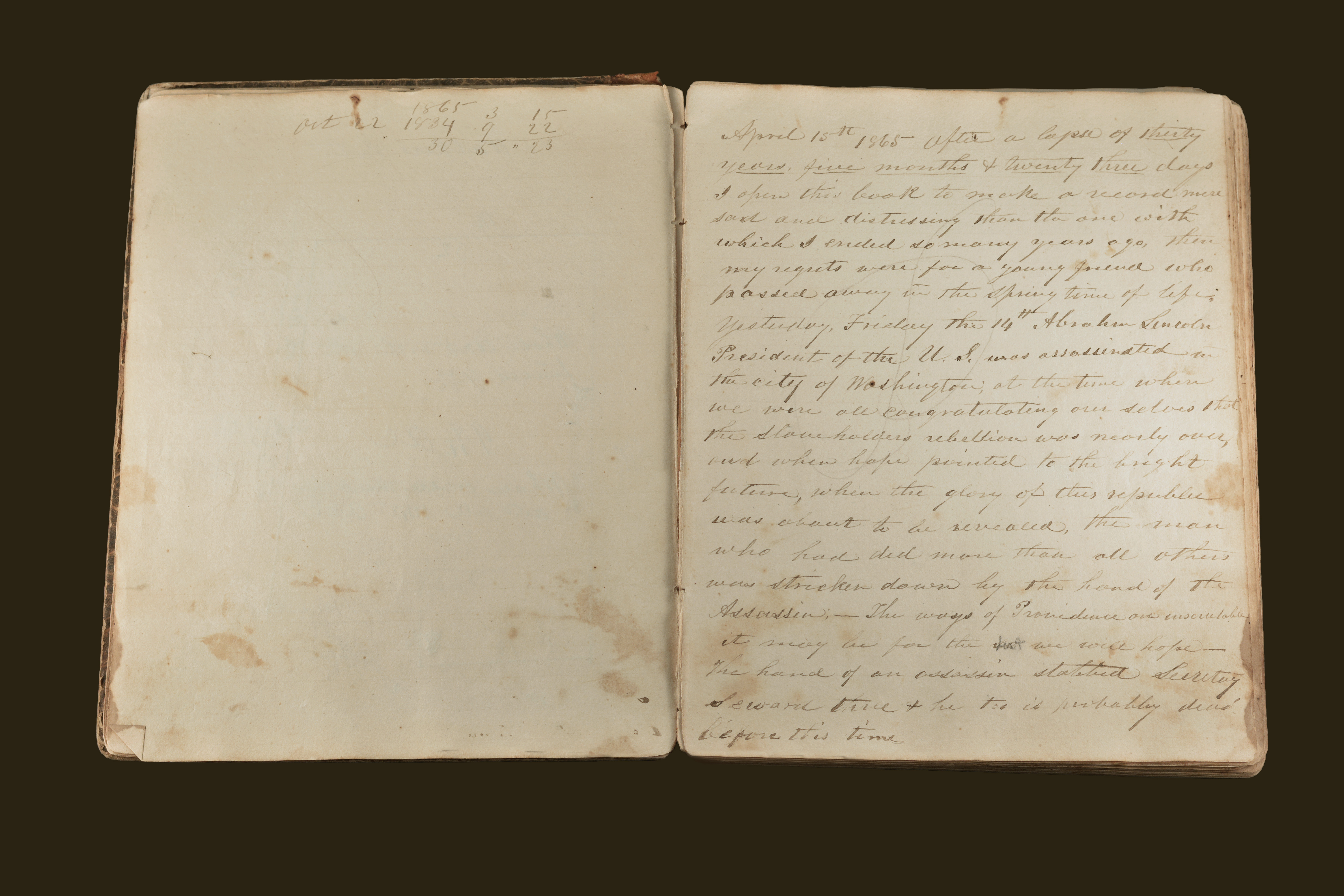
-
Description
After calculating the time since he had last written, Dr. Moses Gage, a physician in Bethel, New York, expressed the emotional whiplash many Americans felt at hearing the news of Lincoln's assassination after celebrating the surrender of General Robert E. Lee five days earlier.
-
Source
Vance Gage
-
Rights
This item may be reproduced and used for any purpose, including research, teaching, private study, publication, broadcast or commercial use, with proper citation and attribution.
-
Creator
Dr. Moses Gage
-
Date
April 15, 1865
from Apr. 22, 1865
Franklin Augustus Buck to Mary Sewall Bradley
-
Full Title
Franklin Augustus Buck to Mary Sewall Bradley
-
Source
Buck Papers, Huntington Library, San Marino, CA
-
Rights
This item is in the public domain and may be reproduced and used for any purpose, including research, teaching, private study, publication, broadcast or commercial use, with proper citation and attribution.
-
Tags
-
Cite this Item
Franklin Augustus Buck. "Franklin Augustus Buck to Mary Sewall Bradley". Remembering Lincoln. Web. Accessed June 15, 2025. https://rememberinglincoln.fords.org/node/694
-
Creator
Franklin Augustus Buck
-
Date
April 22, 1865
from Apr. 22, 1865
Franklin Augustus Buck to Mary Sewall Bradley

-
Source
Buck Papers, Huntington Library, San Marino, CA
-
Rights
This item is in the public domain and may be reproduced and used for any purpose, including research, teaching, private study, publication, broadcast or commercial use, with proper citation and attribution.
-
Creator
Franklin Augustus Buck
-
Date
April 22, 1865
from Apr. 16, 1865
Abigail Williams May to Eleanor Goddard May
-
Full Title
Abigail Williams May to Eleanor Goddard May
-
Description
Abigail Williams May reflected on the wider significance of the two days since President Lincoln's assassination, saying, “You will remember, forever, with satisfaction, that you were alive at this time.”
-
Source
May and Goddard Family Papers, Schlesinger Library on the History of Women in America, Radcliffe Institute for Advanced Study, Harvard University, Cambridge, MA
-
Rights
Use of this item for research, teaching, and private study is permitted with proper citation and attribution. Reproduction of this item for publication, broadcast, or commercial use requires written permission.
-
Tags
-
Cite this Item
Abigail Williams May. "Abigail Williams May to Eleanor Goddard May". Remembering Lincoln. Web. Accessed June 15, 2025. https://rememberinglincoln.fords.org/node/693
-
Creator
Abigail Williams May
-
Date
April 16, 1865
from Apr. 16, 1865
Abigail Williams May to Eleanor Goddard May
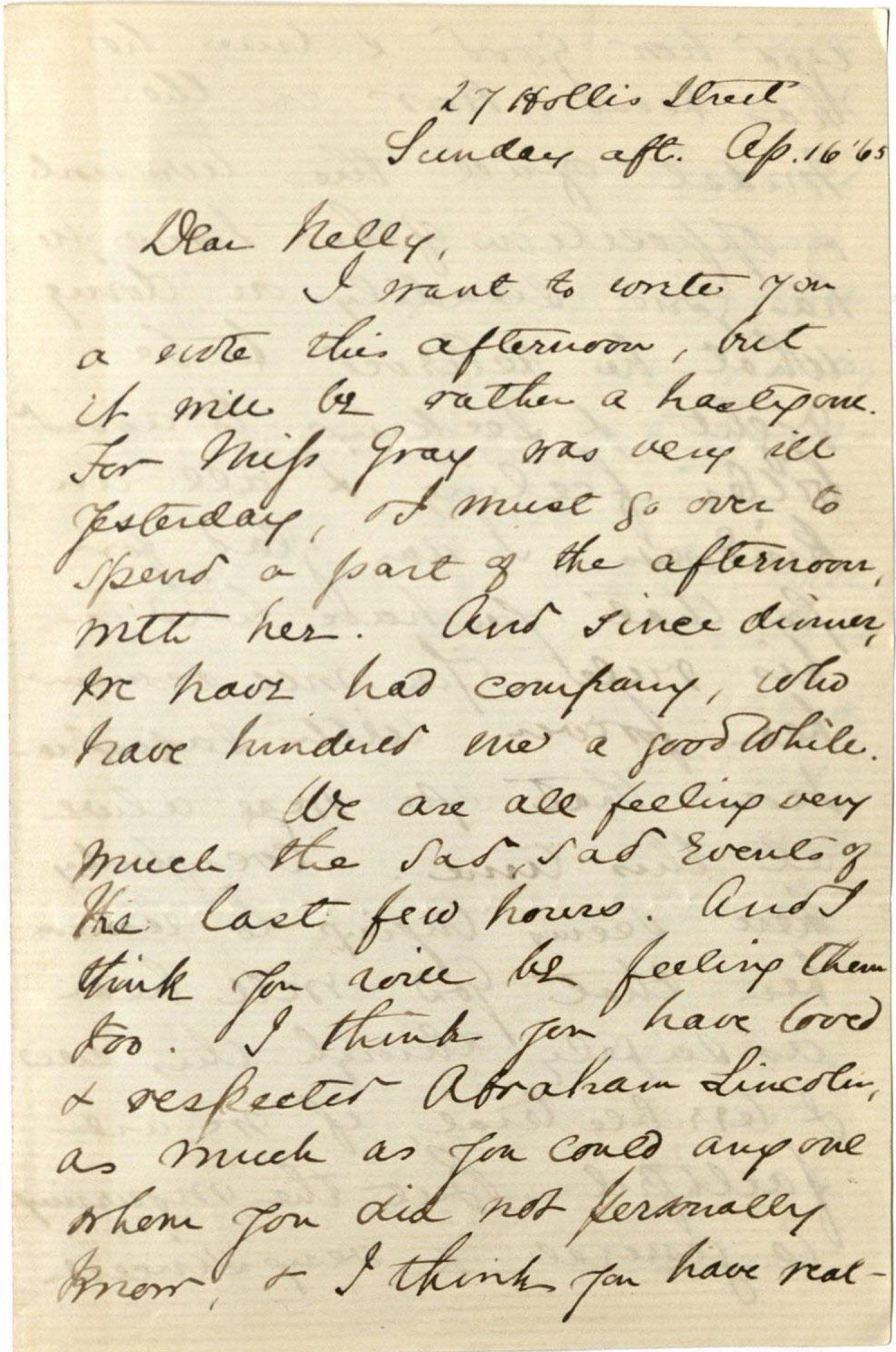
-
Description
Abigail Williams May reflected on the wider significance of the two days since President Lincoln's assassination, saying, “You will remember, forever, with satisfaction, that you were alive at this time.”
-
Source
May and Goddard Family Papers, Schlesinger Library on the History of Women in America, Radcliffe Institute for Advanced Study, Harvard University, Cambridge, MA
-
Rights
Use of this item for research, teaching, and private study is permitted with proper citation and attribution. Reproduction of this item for publication, broadcast, or commercial use requires written permission.
-
Creator
Abigail Williams May
-
Date
April 16, 1865
from Apr. 18, 1865
Albert Browne to “Dear Ones”
-
Full Title
Albert Browne to “Dear Ones"
-
Description
Abolitionist Albert Browne, a U.S. Treasury official at Hilton Head, South Carolina, at the end of the Civil War, wrote home to his family about the events of the few days since the Lincoln assassination. He stated, “O how much I have lived in these few days!”
-
Source
Browne Family Papers, Schlesinger Library on the History of Women in America, Radcliffe Institute for Advanced Study, Harvard University, Cambridge, MA
-
Rights
Use of this item for research, teaching, and private study is permitted with proper citation and attribution. Reproduction of this item for publication, broadcast, or commercial use requires written permission.
-
Tags
-
Cite this Item
Albert Gallatin Browne. "Albert Browne to “Dear Ones"". Remembering Lincoln. Web. Accessed June 15, 2025. https://rememberinglincoln.fords.org/node/692
-
Creator
Albert Gallatin Browne
-
Date
April 18, 1865
from Apr. 18, 1865
Albert Browne to “Dear Ones"
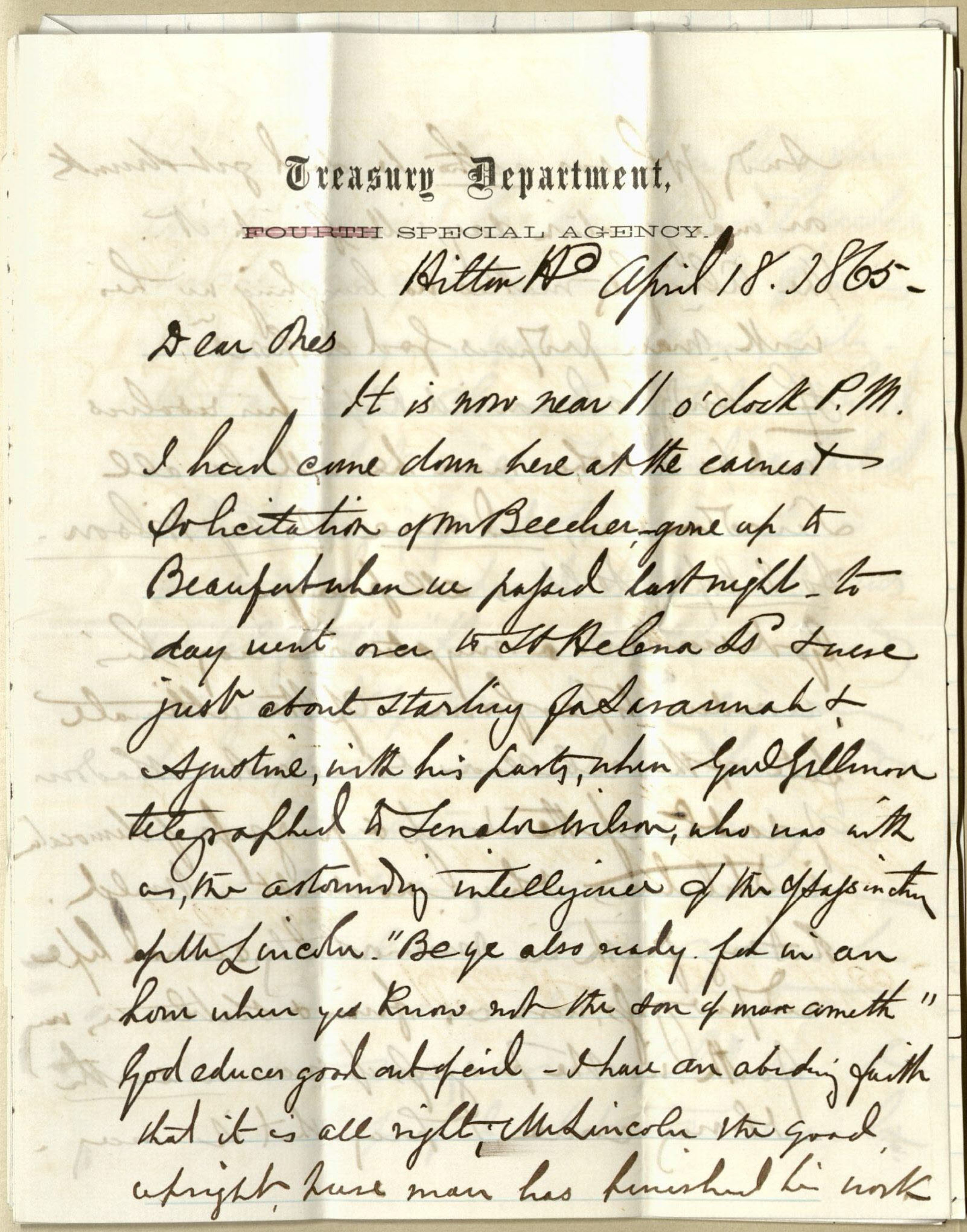
-
Description
Abolitionist Albert Browne, a U.S. Treasury official at Hilton Head, South Carolina, at the end of the Civil War, wrote home to his family about the events of the few days since the Lincoln assassination. He stated, “O how much I have lived in these few days!”
-
Source
Browne Family Papers, Schlesinger Library on the History of Women in America, Radcliffe Institute for Advanced Study, Harvard University, Cambridge, MA
-
Rights
Use of this item for research, teaching, and private study is permitted with proper citation and attribution. Reproduction of this item for publication, broadcast, or commercial use requires written permission.
-
Creator
Albert Gallatin Browne
-
Date
April 18, 1865
from Apr. 30, 1865
Horatio Nelson Taft Diary, April 30, 1865
-
Full Title
Horatio Nelson Taft Diary, April 30, 1865
-
Description
Patent examiner Horatio Nelson Taft discussed the events of the previous month, calling April 1865 "the most eventful in the History of our Country."
-
Transcription
April 30th 1865
This has been a most eventful month. The most eventful in the History of our Country. We have seen during this month the complete crushing out of the “Great rebellion” by a series of masterly Military achievements. The occupation of the Rebel Capitol by our troops. The surrender of Genl Lee with his Army near Richmond, and the surrender of Genl Johnson and his Army in North Carolina, and above all in importance which has occured in the World during this month, The President of the United States has been assassinated. Abraham Lincoln, the good and kind hearted, was Shot while sitting in his Box at Fords Theatre on the night of the 14th Int at about half past ten O'clock. Mr Lincoln had been in the habit of attending the Theatre occasionaly, perhaps once in four or six weeks, as a relaxation from the arduous duties of his position and constant mental exertion. On this occasion he went rather reluctantly. But it had been published in the Bills that Himself and Genl Grant would be present, and Genl Grant having left the City in the evening train for Phila, the President said that he did not “wish the people to be disappointed” and so went with his Lady arriving about ½ past 8. Miss Harris (daughter of Hon Ira Harris) and Maj Rathbone of Albany were also in the same Box, which was a double one, two being thrown into one. This Box was in the 2nd Tier and entered from the Dress circle through a narrow corridor some three feet wide and eight or ten long. There was a door at the dress circle end and at the other end there were two doors, one for each Box but now the two Boxes being thrown into one, one of the doors was closed. The other was open, and all of them unguarded. The assassin J Wilkes Booth had made his arrangements in the most deliberate manner (probably during that day). He had fixed a bar across the door leading into the dress circle and had cut a hole through the closed door leading to the Box, which enabled him to see the exact position of the President and others in the Box without being seen himself. At about ½ past 10, he entered the corridor from the Dress circle, bared the door to prevent any one from entering, examined the position of Mr Lincoln through the hole in the closed door. Then entered the Box behind all who were there (as they were looking toward the stage) and standing within three or four feet of Mr Lincoln, Shot him in the back of the head. The ball entering about two inches from the left ear near the base of the skull and lodging in the brain about two inches back of the right eye. His head was probably inclined forward at the time. The Murderer rushed to the front of the Box with a dagger in his hand. Major Rathbone caught his coat but Booth struck him on the arm with the dagger wounding him severely, which compelled him to let go his hold. Booth vaulted over the front of the Box and as he did so exclaimed “Sic Semper Tyranis” (Thus To Tyrants). As he Jumped from the box his spur cau[gh]t in the flag and as he struck the to see the exact position of the President and others in the Box without being seen himself. At about ½ past 10, he entered the corridor from the Dress circle, bared the door to prevent any one from entering, examined the position of Mr Lincoln through the hole in the closed door. Then entered the Box behind all who were there (as they were looking toward the stage) and standing within three or four feet of Mr Lincoln, Shot him in the back of the head. The ball entering about two inches from the left ear near the base of the skull and lodging in the brain about two inches back of the right eye. His head was probably inclined forward at the time. The Murderer rushed to the front of the Box with a dagger in his hand. Major Rathbone caught his coat but Booth struck him on the arm with the dagger wounding him severely, which compelled him to let go his hold. Booth vaulted over the front of the Box and as he did so exclaimed “Sic Semper Tyranis” (Thus To Tyrants). As he Jumped from the box his spur cau[gh]t in the flag and as he struck the Stage he came to a crouching position from the effect of the concussion, his hands striking the floor but he recovered himself in a moment and flourishing his dagger he strode across the Stage some forty feet in sight of the spectators and past some of the actors, and reaching the back door which opens into a lane, he mounted a fleet horse and escaped. The lane enters F St betwen 9th & 10 Sts. The audience was paralized for some seconds, but rushed on to the Stage. A Surgeon was called for and Charles S Taft a Surgeon being present was lifted up from the Stage to the Box by those present. Before this the bar had been removed by Maj Rathbone and several men had reached the Box. When Chas reached the Box the President was lying upon the floor. Water and stimulants were used immediately but without avail in attempts to revive him. He was taken up and carried from the Theatre to the House opposite in
about fifteen minutes after he was shot. A Dr Leale from Armory Square Hospital was the first Surgeon in the box. But Chas did not know that there was any Surgeon but himself present until the President was removed from the Theatre. Chas had charge of him until Dr Stone (the Presidents family Physician) arrived which was half an hour after he was placed on a bed at the House of Mr Peterson, opposite. When the shot was fired Mrs Lincoln was sitting near her husband with her hand on his knee. She says she saw the flash and heard the report of the pistol, thinking it was in some way connected with the the Play. She leaned forward to see what it was, and then looked to Mr Lincoln to see where he was looking. He was sitting with his head droped down and eyes shut. She was not alarmed at this, he sometimes held his head in that way when in deep thought, but she put her hand on his forehead and he not stirring she put it on the back of his head and feeling it wet she immediately withdrew it covered with blood. She then screamed and that is the last she remembered that took place in the Theatre. She says, as she put her hand on his head she recollects that something suddenly brushed past her and rubbing off her Shawl. It was Booth as he jumped from the Box. The President made no noise, nor attempted to speak, nor Stirred a limb after he was shot, nor was he conscious for one moment from that time until he died. When his skin was touched or his hand was taken, there was a slight quiver or tremor of the muscles, but that was all. Mustard paste was applied nearly all over the body and stimulants were given as long as he could swallow in hopes to revive him but entirely without avail. His pulse ceased to beat at 22 minutes past Seven. Chas had his hand on his heart, he said it fluttered or trilled for 10 seconds longer. It was the opinion of the Surgeons that the wound would have killed most men instantly, or in a very few minutes. But Mr Lincoln had so much vitality that he lived nearly nine hours. There were four Surgeons in immediate or active attendance. Dr Stone, The Surgeon Genl Dr Barnes, The Assistant Surgeon Genl Dr Crane and Charles. Some others were present whose services were not required. Most of the members of the Cabinet were there all night. Chief Justice Chase and other distinguished men. Mr Senator Sumner with Robert Lincoln leaning on his shoulder near the head of the bed. Sec'y Stanton was active in giving directions and writing dispatches all night. Genl Meigs Stood at the door to keep out all who were not wanted or to see that the room was not crowded. The room is at the end of the entrance Hall about 9 feet by 15, with two windows and three doors, one door entering from the Hall, one at the left as you enter, opening to an open porch or piazza, and the other at the farther end of the room, opening into another small room from which stairs decended to to [sic] the Basement. Some few individuals came in to the room through that door clandestinely. Mrs Lincoln occupied a room near by with some of her friends who were there. She went in frequently to see the President with Doct Gurley (The family Pastor) who had been sent for about 3 O'clock. She was not in the room when he died. Robert Lincoln was there and Dr Gurley, the two private Secretaries of the President Nicolay and Hay. Upon one occasion when Mrs L went in and saw her husband she fainted and was carried out insensible. It was thought best for her not to be there when he died. Dr Gurley prayed by the bedside of the President when he first arrived (at 3 o'clock). Then went into the room where Mrs Lincoln was and prayed with her, and remained with her most of the time, accompanying her and supporting her into the room of the dying President when she visited it. After the death Dr Gurley who was standing near Mr Stanton said shall we have any religious exercises here or elsewhere now? Yes said Mr Stanton offer Prayer ________ now and here. For the last half hour before the death, the utmost stillness had prevailed in the room, not a word, not a whisper was heard. The President of the United States dying, surrounded by his Cabinet and many of the first men in the Nation standing like statues around the bed presented a scene for an artist seldom equaled for solemn grandeur. It is to be hoped that it will yet be transfered to Canvass. After the President died Dr Gurley went to Mrs L and told her “the President is dead.” O - why did you not let me know? Why did you not tell me? “Your friends thought it was not best. You must be resigned to the will of God. You must be calm and trust in God and in your friends.” She soon after left, with Dr G for her Home. She was asked during the night if her son “Tad” (Thaddeus) (a boy about twelve years old) should be sent for. “O, my poor “Taddy” what will become of him? O do not send for him, his violent grief would disturb the House.” When they reached the Presidents house “Tad” met them on the Portico. “Where is my Pa? Where is my Pa? He kept repeating the question till they got into the room of Mrs Lincoln. He had heard that his Pa had been shot but evidently expected him when his mother came. He was very much excited and alarmed but had not thought that his Pa could be dead. “Taddy” your Pa is dead” said Dr Gurley. He was not prepared for this. He screamed in an agony of grief “O what shall I do? What shall I do? My Brother is dead. My Father is dead. O what shall I do? What will become of me? O what shall I do? O mother you will not die will you. O don't you die Ma. You wont die will you Mother? If you die I shall be all alone. O dont die Ma.” Dr Gurley said that up to that time he himself had not shed a tear, but he could not witness “Tads” grief unmoved and the Tears flowed freely. He said, when I got back to my own house at about 10 o'clock that morning, “I felt as though I had been engaged all night in a terrible Battle and had but just strength enough left to drag myself off the field.” -
Source
-
Rights
This item is in the public domain and may be reproduced and used for any purpose, including research, teaching, private study, publication, broadcast or commercial use, with proper citation and attribution.
-
Tags
-
Cite this Item
Horatio Nelson Taft. "Horatio Nelson Taft Diary, April 30, 1865". Remembering Lincoln. Web. Accessed June 15, 2025. https://rememberinglincoln.fords.org/node/691
-
Creator
Horatio Nelson Taft
-
Date
April 30, 1865
from Apr. 30, 1865
Horatio Nelson Taft Diary, April 30, 1865
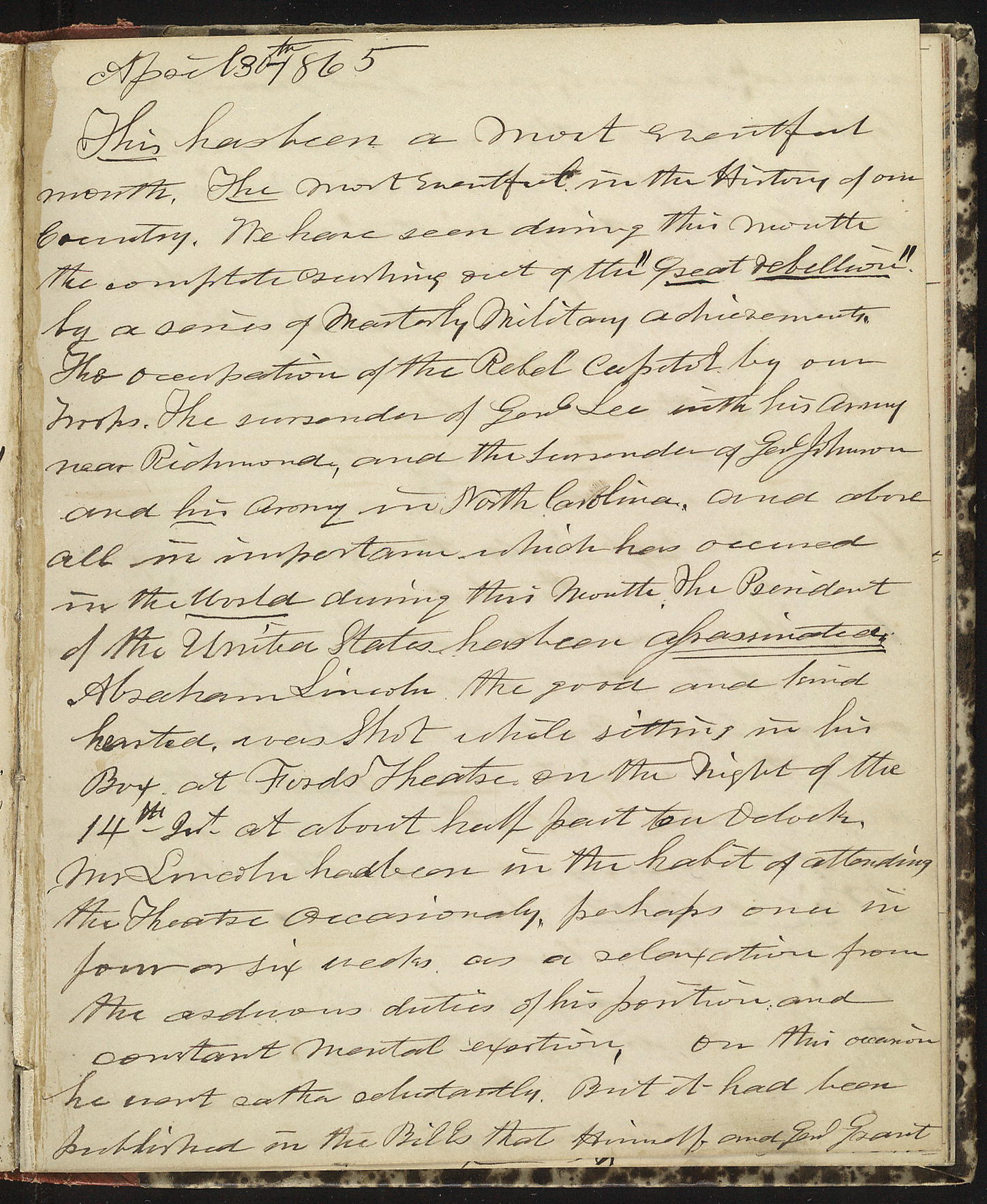
-
Description
Patent examiner Horatio Nelson Taft discussed the events of the previous month, calling April 1865 "the most eventful in the History of our Country."
-
Source
-
Rights
This item is in the public domain and may be reproduced and used for any purpose, including research, teaching, private study, publication, broadcast or commercial use, with proper citation and attribution.
-
Creator
Horatio Nelson Taft
-
Date
April 30, 1865
from May. 30, 1865
Horatio Nelson Taft Diary, May 30, 1865
-
Full Title
Horatio Nelson Taft Diary, May 30, 1865
-
Description
Patent examiner Horatio Nelson Taft reflected on the events of the first five months of 1865.
-
Transcription
Washington May 30th 1865
The achievements of the Country during the past six or seven months, if we take a rapid glance at them, are truly astonishing. A catalogue merely of the striking Military events during that period would almost fill a volume. Beginning with the time that Thomas almost annihilated the army of the Rebel Genl Hood at Franklin and Nashville. Then following Genl Sherman in his daring plunge into the heart of Georgia. The Storming of Fort McAllister, and the Capture of Savannah, almost without a Siege, with all its Wealth and vast Armaments. Then sweeping through South Carolina like a desolating Tornado. Compelling the Surrender of Charleston tho not within a hundred miles of it. Capturing the Capital of the State without a Battle (Columbia). Entering North Carolina, defeating the Rebels under Johnston at Bentonville and Averysboro and capturing the Capital of the State Raleigh and to close this successful march receives the surrender of Johnston and his Army. During this time, the month of March, Genl Terry captures Fort Fisher at the mouth of the Cap[e] Fear River (one of the most desperate and heroic acts of the War). Thus compelling the surrender of Willmington a few days afterwards. During this time also Schofield was fighting betwen Wilmington and Raleigh around Kinston and penetrating to Goldsboro. It is now the latter part of March and Genl Grants Movements begin to absorb the attention of the Country. The rebels surprise and capture Fort Steadman (one of Grants line of Forts) but dearly did it cost them for they were easily driven away. And then began those decisive movements and series of splendid victories which compelled the surrender of Petersburgh and Richmond and finaly the Capture of Genl Lee and his whole army, and the Great Rebellion was virtualy ended. But during this time again, Genl Canby was forcing his way into Mobile. Genl Wilson is “riding free” with a Cloud of horsemen over Alabama and Georgia scattering all opposition, capturing Selma, Montgomery, and Macon. Stoneman is dashing through Eastern Tennessee and N Carolina, riding at will and driving all before him. Then Taylor and Kirby Smith Surrender which embrace about the last of the rebel forces. But during this period of Six or Seven months, the realy most important events have not been yet mentioned. In the midst of a desolating War, in the smoke and heat of Battle as it were, There has been a quiet Presidential Election and Inauguration, with all its usual attendant excitements. A Draft of three hundred thousand men has been ordered, and the men raised. The Government Credit has been increased at home and abroad a hundred fold and Gold has fallen a hundred percent. Our great and Good President has been assassinated. The assassin Killed. Jefferson Davis has been captured and impeached for Treason. The grand Review & the Trial of the conspirators. Tearfully - and Joyfully have we witnessed these Events.
-
Source
-
Rights
This item is in the public domain and may be reproduced and used for any purpose, including research, teaching, private study, publication, broadcast or commercial use, with proper citation and attribution.
-
Tags
-
Cite this Item
Horatio Nelson Taft. "Horatio Nelson Taft Diary, May 30, 1865". Remembering Lincoln. Web. Accessed June 15, 2025. https://rememberinglincoln.fords.org/node/690
-
Creator
Horatio Nelson Taft
-
Date
May 30, 1865
from May. 30, 1865
Horatio Nelson Taft Diary, May 30, 1865
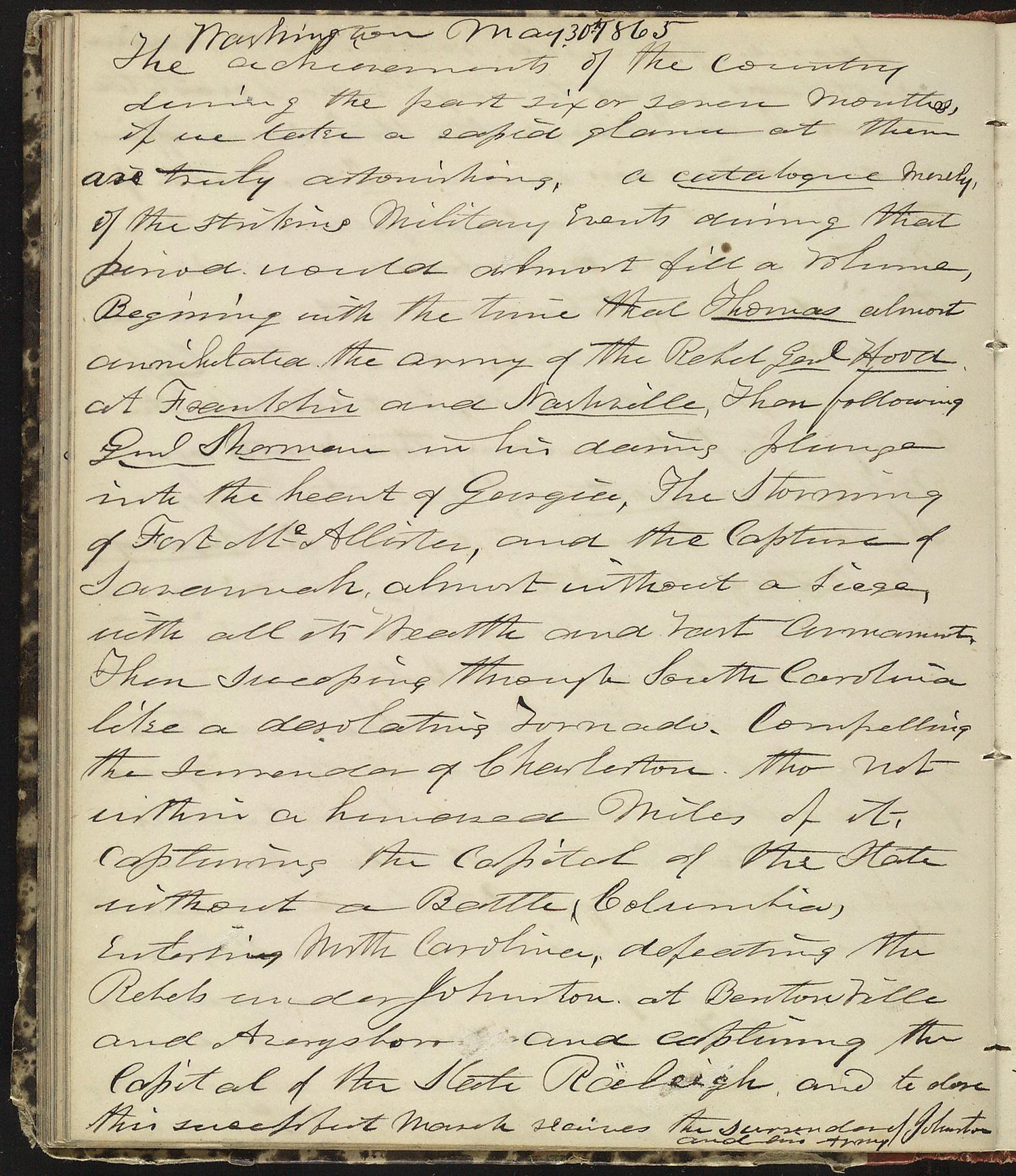
-
Description
Patent examiner Horatio Nelson Taft reflected on the events of the first five months of 1865.
-
Source
-
Rights
This item is in the public domain and may be reproduced and used for any purpose, including research, teaching, private study, publication, broadcast or commercial use, with proper citation and attribution.
-
Creator
Horatio Nelson Taft
-
Date
May 30, 1865